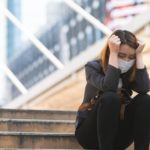 Inequality has been a growing concern for a number of years now, and especially since the 2008 financial crisis. As with that event, the fallout of the current Covid-19 pandemic is tending to be disproportionately felt by the least well off members of society.
Inequality has been a growing concern for a number of years now, and especially since the 2008 financial crisis. As with that event, the fallout of the current Covid-19 pandemic is tending to be disproportionately felt by the least well off members of society.
New research from Indiana University highlights how women, the young, people of color, and those with less formal education are being hit hardest by the pandemic.
Unequal pain
For instance, the data found that Black adults were around three times as likely to suffer from food insecurity or redundancy during the pandemic. Similarly, those with no college education were twice as likely to suffer from these things as those with a college degree, with those without even high school education four times as likely to suffer.
What’s more, this general pattern persisted even when one’s employment status and financial situation prior to the pandemic were considered. The researchers believe it’s clear evidence of the widening inequality between those with and those without during the pandemic.
“It is clear that the pandemic has had an extraordinary impact on the economic security of individuals who were already vulnerable and among disadvantaged groups,” they explain. “This work demonstrates the need for strategically deployed relief efforts and longer-term policy reforms to challenge the perennial and unequal impact of disasters.”
Precarious footing
It’s increasingly accepted that crises disproportionately affect those who were struggling to begin with. What’s more, vulnerable communities take much longer to recover from these events than more prosperous ones.
This general heuristic was reaffirmed by the IU study, which highlighted how people who were already concerned about things such as money, food, and housing, also reported much greater concern about these things as a result of the pandemic.
“Providing basic resources to all Americans, such as generous unemployment benefits, paid family leave, affordable federal housing and universal preschool will help communities better weather crisis,” the researchers conclude. “We need to rethink how we intervene in disasters and also strengthen our social safety net for everyone.”